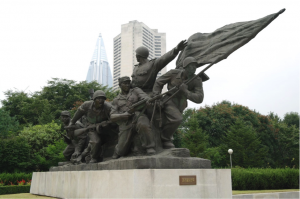 June is a most important month in the Korean calendar, first and foremost because it was on the 25th of this month, in 1950, when the Great Fatherland
Liberation War started. It ended on 27 July 1953 in victory for the DPRK and defeat for the combined forces of imperialism (disguised as a truce).
June is a most important month in the Korean calendar, first and foremost because it was on the 25th of this month, in 1950, when the Great Fatherland
Liberation War started. It ended on 27 July 1953 in victory for the DPRK and defeat for the combined forces of imperialism (disguised as a truce).
Although to cover their criminal aggression the imperialists invariably claim that it was the DPRK which started the war (which quite frankly it would have been entitled to do in order to expel the US imperialist occupation from the south of the Korean peninsula so as to unify the whole of the Korean nation), the truth is that it was the US puppet regime of Syngman Rhee, with full US backing, which started the war. US imperialism hoped to use its south Korean puppets to overthrow the communist government in the north of the country and to unite the whole of the Korean peninsula under its tutelage. The south Korean government, however, had little popular support, having been imposed on the people of the south against their wishes. It was not a popular government like that of the north, and when its forces attacked the north, they were quite unable to resist the north’s counter-offensive.
For one thing, the north was the home of the Korean People’s Army that had been fighting Japanese imperialism with great success for years under the gifted command of Comrade Kim Il Sung, a most talented military leader. Comrade Kim Il Sung thus found himself at the military helm once more, as well as the political helm, leading the people of Korea in their life-and-death struggle to defend the gains of their revolution-the end of feudalism, the end of colonial exploitation, land reform and socialist opportunity. Furthermore, thanks to socialist economic planning, the entire economy of north Korea could rapidly be put on a war footing to produce the materiel necessary for the people to defend themselves.
The military humiliation of south Korea’s puppet government was devastating. Not only did its attack on north Korea fail utterly, but the counter-attack resulted in the liberation of Seoul, the capital of south Korea, only 3 days later on 28 June., when the people of that city flocked onto the streets to welcome their liberators.
Seeing that its strategy of getting the south Koreans to fight their war for it had failed, US imperialism rushed weeping to the UN Security Council demanding action be taken against north Korean ‘aggression’. The Security Council actually had no power to take any decisions at all because one of its members, the Soviet Union, had absented itself. This did not stop it from flouting international law and passing the resolution under whose ‘authority’ US imperialism went to war against tiny Korea, together with 20 other countries, many of which were rich and powerful imperialist countries. They faced initial defeats to which they responded by sending yet more troops and materiel into the fray in vast quantities. Luckily Korea was not isolated in the world. It too had good friends, especially in the socialist countries, who rallied unstintingly to its support
After three years of the most cruel war, in which 4 million Koreans lost their lives and many more were wounded, US imperialism realised it could never win and it called a truce that left south Korea under its occupation, but also north Korea free to continue its building of socialism and a happy life for its people.
Comrade Kim Il Sung summed up the importance of this victory when he said:
“The Korean war clearly showed to the peoples all over the world that no force can conquer a people who are up for the freedom and independence of their country against colonialism, and that the time is long past when the imperialists exploited and oppressed the peoples of colonial and dependent countries as they pleased”.
Comments are closed, but trackbacks and pingbacks are open.